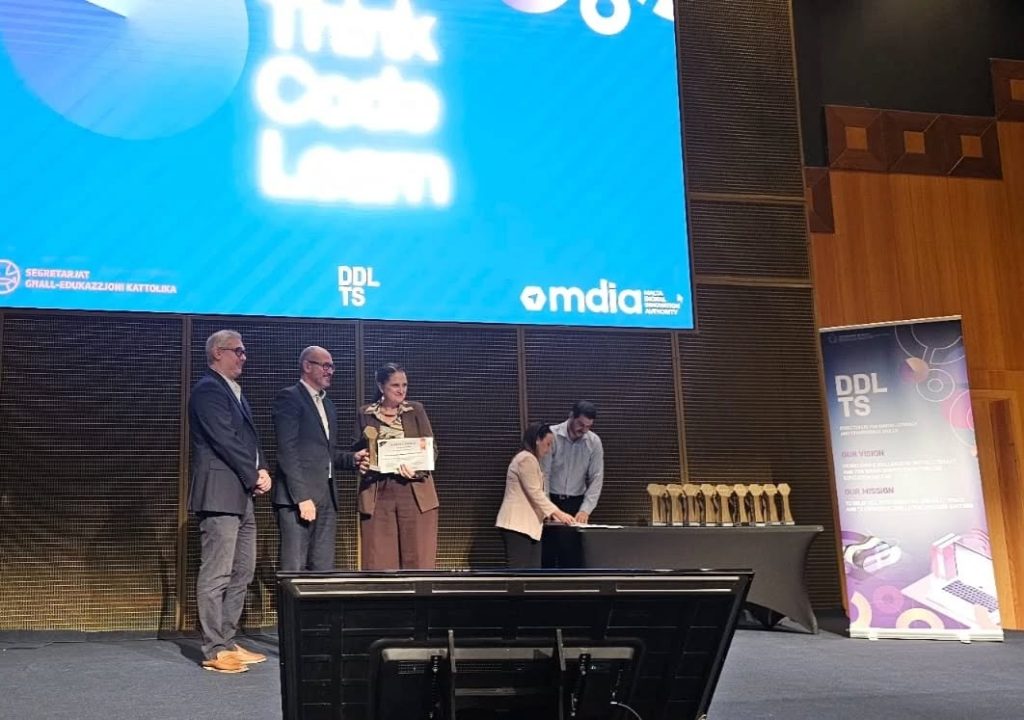Malta Lights Up the EU Code Week Map with Creativity, Collaboration and Coding!
Malta has kicked off EU Code Week 2025 in true digital style — already ranking second on the European scoreboard with over 921 activities and more to come!
From coding dances and Bee-Bot adventures to national awards and leadership events, Maltese schools and educators are showing that coding can be creative, inclusive and fun for everyone.
🚀 A Strong Start: Malta’s Code Week Launch
The celebrations began early this year. On 30 September, the Curriculum Entitlement Department within the Secretariat for Catholic Education, together with the Malta Digital Innovation Authority (MDIA), and the Directorate for Digital Literacy & Transversal Skills (DDLTS), hosted an online meeting with Church School Senior Leadership Teams.
Introduced by Ms Angela Charles, Director for the Curriculum Entitlement Department within the Secretariat for Catholic Education, and featuring presentations by Ms Marisa Abela Gatt and Mr James Callus, the session highlighted the importance of integrating coding into education.
All collaborators agreed that coding is a fundamental skill for holistic learning, fostering problem-solving, creativity and digital fluency.
Just a few days later, on 9 October, MDIA officially launched EU Code Week 2025 with the message:
“Code is more than a language: it’s a tool for building, solving and shaping the future.”
From bootcamps to Minecraft challenges, the MDIA launch underscored Malta’s growing leadership in
digital skills, creativity and innovation — empowering every learner to become a creator.
🏆 Celebrating Digital Innovation at Think Code Learn
Nearly a week later, the Think Code Learn event brought together educators and innovators to celebrate the
Coding Festa Awards 2024/2025. Organised in collaboration with Organised in collaboration between the Directorate for Digital Literacy & Transversal Skills (DDLTS), the Malta Digital Innovation Authority (MDIA), and the Curriculum Entitlement Department within the Secretariat for Catholic EducationDDLTS, MDIA, and
Digital Literacy within SfCE, the event opened with an engaging keynote by Quinton Scerri and inspiring talks from:
- Kenneth Brincat, CEO of MDIA, on the future of digital innovation in education
- Neil Attard, Director of DDLTS, presenting the Digital Education Strategy
- James Callus, EU Code Week Edu Coordinator, introducing the EU Code Week School Label
- Marion Bugeja from the MDIA DiHubMT team, announcing a train-the-trainer programme for educators
🎖️ EU Code Week 3D-printed awards and certificates were presented to 42 schools for their outstanding achievements in promoting coding and digital literacy.

💻 Creativity in the Classroom
Across Malta, classrooms came alive with imaginative coding challenges and unplugged activities. Two schools in particular captured the Code Week spirit perfectly:
Sacred Heart School, Malta
- Year 4 learners became coding adventurers, guiding Laurel the Explorer through a treasure hunt using code — a fun introduction to sequencing, logic and teamwork.
- Year 3 Sunflowers tackled the Angry Birds maze challenge, learning coding commands to move their bird through obstacles — proving that problem-solving can be both playful and powerful!
St Augustine College
- Year 4 Yellow students explored the Maltese Islands with Bee-Bots, combining coding with geography and social studies.
- Year 10 Italian students joined Il Ballo del Coding, an unplugged coding activity turning programming logic into dance sequences, reinforcing vocabulary and creativity.
Maria Regina College Middle School Naxxar
- Year 7 learners explored the topic of Numbers through exciting interactive games.
- Year 8 learners dived into the topic of Family, showing off their skills through fun online activities.
St. Margaret College Senglea Primary School
- Year 5 and Year 6 learners, accompanied by their parents or guardians, participated in an engaging robotics session that introduced the basics of robotics and included a special encounter with a robot dog
These inventive activities show how Maltese educators are weaving coding into every subject — from ICT to languages — and helping learners develop both digital and cognitive skills.


